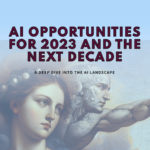Can AI Become our Thought Partner? Here is how to use AI for Redefining Cognitive Dynamics
In the realm of cognitive abilities, humans have long held the mantle of unparalleled creativity, emotional intelligence, and nuanced decision-making. Yet, the emergence of Artificial Intelligence (AI) has shifted this paradigm, introducing a new dimension to thought partnership. The crux lies in understanding the distinctive competencies of AI compared to human cognition and harnessing this synergy to redefine the standards of quality thought.
Divergent Competencies: AI vs. Human Cognition
AI embodies precision, scalability, and computational prowess. Its capacity to process vast volumes of data in seconds, recognize complex patterns, and derive insights is unparalleled. This computational dexterity grants AI the ability to swiftly analyze scenarios, predict outcomes, and propose solutions based on data-driven algorithms.
On the flip side, human cognition thrives on creativity, empathy, intuition, and contextual understanding. Emotional intelligence, moral reasoning, and the ability to navigate ambiguity are hallmarks of human thinking. Humans excel in synthesizing diverse inputs, employing abstract thinking, and discerning intricate relationships beyond pure data analysis.
Doubling Down on Human Uniqueness
The rise of AI as a thought partner necessitates a focus on human strengths. Empathy, emotional intelligence, ethical reasoning, and creativity form the bedrock of human cognitive prowess. These uniquely human traits allow individuals to navigate uncertain terrains, cultivate interpersonal relationships, and tackle problems that transcend mere data-driven solutions.
Harnessing these strengths involves doubling down on creativity, emotional intelligence, and ethical decision-making. By amplifying these qualities, individuals can complement AI’s analytical abilities with nuanced, human-centric perspectives. This fusion fosters a symbiotic relationship where AI augments human thought without overshadowing its innate characteristics.
The New Standard of Quality Thought with AI
AI doesn’t merely augment human thought; it redefines the parameters of quality thinking. The amalgamation of AI’s analytical rigor with human ingenuity sets a new benchmark for comprehensive and informed decision-making. This synergy fosters a holistic approach, balancing quantitative analysis with qualitative insights, thereby enhancing the depth and breadth of deliberations.
Training an AI Thought Partner: Shaping Various Roles
Leaders seeking to harness AI as a thought partner can tailor its role to suit their needs:
- Critic: Configure AI to scrutinize ideas, providing constructive feedback and challenging assumptions, fostering robust decision-making.
- Twin: Develop AI to simulate thought processes, enabling individuals to explore divergent perspectives and anticipate various outcomes.
- Mentor: Customize AI to offer guidance based on accumulated knowledge, assisting in skill development and strategic thinking.
- Philosopher: Equip AI to delve into ethical quandaries, encouraging contemplation on moral dilemmas and societal impacts.
- Guide: Configure AI to navigate complex landscapes, aiding in strategic planning and risk assessment.
Here are a few example from two distinct industries that show the potential of leveraging AI as our thought partner:
AI as a Thought Partner for Education Leaders and Teachers
1. Critic: Education leaders can employ AI as a Critic to enhance decision-making processes within educational institutions. By configuring AI to analyze proposed ideas, curricula changes, or teaching methodologies, it can provide valuable feedback. This feedback isn’t just about pointing out flaws; it’s about encouraging critical thinking. AI can challenge assumptions, highlight potential biases, and prompt educators and administrators to reconsider their approaches. This fosters a culture of robust decision-making and continual improvement within the educational framework.
2. Twin: Developing an AI Twin in an educational setting allows for the simulation of diverse teaching methods and learning experiences. By modeling various scenarios, AI can provide educators with insights into how different approaches might impact student learning. It can simulate the outcomes of pedagogical choices, helping leaders anticipate challenges and adapt strategies to cater to different learning styles. This aids in fostering a more inclusive and adaptable educational environment.
3. Mentor: Customizing AI as a Mentor empowers educational leaders to offer personalized guidance to both educators and students. Drawing from a wealth of accumulated knowledge, AI can assist in skill development for teachers, suggesting tailored training programs or resources. For students, AI can provide personalized learning paths, recommending supplemental materials or adaptive learning modules based on individual progress. This guidance not only supports skill enhancement but also nurtures a culture of lifelong learning.
4. Philosopher: Incorporating AI as a Philosopher enables education leaders to navigate ethical considerations within academia. AI can engage in discussions on ethical dilemmas related to teaching methodologies, technology integration, student data privacy, and more. By encouraging contemplation on moral quandaries, AI can facilitate discussions among educators and students, fostering critical thinking and ethical reasoning skills. This prepares future generations to make informed decisions in a morally complex world.
5. Guide: Using AI as a Guide equips educational leaders with a tool to navigate the complex educational landscape. AI can analyze data on student performance, demographic trends, resource allocation, and educational policies to aid in strategic planning. It can assist in identifying potential risks, predicting outcomes of policy changes, and optimizing resource distribution. This supports leaders in making data-informed decisions for the betterment of the educational institution.
In essence, each of these AI roles tailored for education leaders serves as a strategic tool, augmenting decision-making processes, fostering critical thinking, promoting inclusivity, and ensuring ethical considerations within the realm of education. Integrating AI in these roles amplifies the effectiveness of educational leadership by leveraging its capabilities to complement and enhance human expertise.
AI as a Thought Partner for Nurse Leaders and Healthcare Leaders
1. Critic: In healthcare, utilizing AI as a Critic can greatly benefit decision-making processes. AI can scrutinize treatment plans, protocols, or proposed healthcare strategies. It could analyze patient data, suggest alternatives, and challenge assumptions, thereby aiding in more informed and evidence-based decisions. By identifying potential biases or overlooked variables in medical decisions, AI fosters a culture of robust decision-making, ultimately improving patient care outcomes.
2. Twin: Developing AI as a Twin for healthcare leaders could involve simulating patient scenarios or treatment approaches. AI can simulate various healthcare interventions or patient journeys, allowing healthcare providers to anticipate outcomes and make more informed decisions. This aids in understanding the potential impact of different treatment paths, optimizing care plans, and adapting strategies to accommodate diverse patient needs and conditions.
3. Mentor: Customizing AI as a Mentor in healthcare can assist in skill development and strategic thinking for healthcare professionals. AI can offer guidance based on accumulated medical knowledge, recommend relevant training modules, or suggest resources to enhance clinical skills. It can also provide insights into the latest medical research and best practices, supporting continuous learning and improved patient care.
4. Philosopher: AI as a Philosopher in healthcare settings can help navigate ethical dilemmas prevalent in patient care. It can engage healthcare professionals in discussions about complex ethical scenarios, such as end-of-life care, allocation of resources, or patient confidentiality. By encouraging contemplation on moral quandaries, AI can assist in decision-making processes that are in line with ethical standards, ensuring patient well-being and ethical practice.
5. Guide: Using AI as a Guide in healthcare allows leaders to navigate the complex landscape of healthcare systems and patient care. AI can analyze vast amounts of patient data, healthcare trends, and regulatory changes to aid in strategic planning. It can assist in identifying potential risks, predicting healthcare outcomes, and optimizing resource allocation, thereby contributing to improved operational efficiency and patient care quality.
In the healthcare domain, these AI roles serve as invaluable tools for nursing and healthcare leaders, enhancing decision-making, fostering ethical practices, optimizing care pathways, and supporting continuous improvement in patient outcomes. Integrating AI in these capacities empowers healthcare professionals to leverage data-driven insights while preserving the human-centric aspects of care delivery.
The evolution of AI as a thought partner heralds a paradigm shift in cognitive dynamics. By leveraging the strengths of both AI and human cognition, individuals can cultivate a synergistic relationship that redefines the standards of quality thought. Training AI to represent diverse roles empowers leaders to navigate complexities, innovate, and make informed decisions in an era where cognitive augmentation is key.


